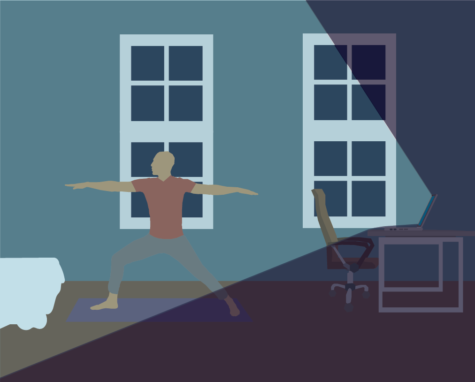OPINION | Escapism can wreck mental health
October 6, 2021

As in-person classes started up again last week, it did not take long for me to feel the stress of college. Essays needed to be submitted. Work needed to be completed. Endless studying seemed to be my future. The feeling of not being able to catch a break was overwhelming, and all I wanted to do was bury my neck in the sand.
Turns out, I am not alone.
More than 20% of students experienced at least six stressful life events in a year; this stress is strongly linked to mental health diagnoses, self-harm and suicidality. Because of the continuous responsibilities of school, extracurriculars, jobs and more, stress becomes chronic, inducing anxiety, irritability and even substance abuse. In fact, the cycle of negative effects can exacerbate already-present mental illnesses.
Most of the time, college students cannot find a proper outlet for their stress so it is dealt with through consuming media and escaping the worries found in reality. The easiest way to cope with problems is to forget they exist — and that feeling is addictive. This is escapism, the want to find relief from the pressures of the world through engaging in entertainment or fantasy.
While alcohol and drug use are the first forms of escapism to come to mind, many seemingly harmless activities can lead to a worsening mental health. Of course, reading a book is not unhealthy. But, pouring through novels for hours at a time to escape to a safer and narrower world is. In these situations, the feelings of anxiety from not doing homework, for example, will compound the more one puts it off.
In the spare moments I am not busy, I seek to escape the monotonous and tiring life I have. And when I treat myself to entertainment in the form of TV or books, I do not want to stop. In an endless cycle of being lost in the media I consume and then scrambling to finish all my work, I felt worse and worse. Yet, I could not break the cycle without feeling incredibly burnt out.
A study found that “binge watching to avoid problems is a commonly employed strategy for individuals to cope with stress.” However, using binge-watching as a coping mechanism resulted in feelings of guilt and regret. This is tied in with the desire to be continuously productive. In society, it is understood that productivity is rewarded, and when not actively achieving goals, negative emotions about oneself arise.
Although detrimental when practiced in large amounts, escapism is not inherently bad. In fact, it can give your brain relief from the stress of everyday life. Positive escapism serves to bring one from a narrower to a broader world. Instead of indulging too much in escapism, try managing stress through relaxation techniques such as yoga, meditation and deep breathing. Additionally, by setting goals, one can reduce the stress that causes temptation for escapism in the first place.
It is best to take escapism at face value. Escapism can only truly ever be a temporary solution to a much more permanent problem. Rather, for long term stress relief, it is important to focus on learning one’s stress triggers to replace negative thinking.










Leave a Comment